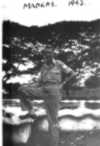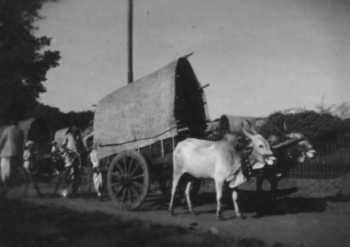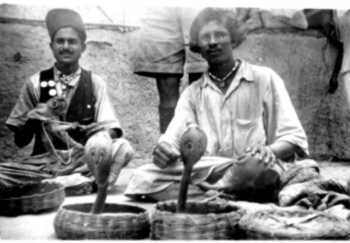
home | 1900 | 1925 | 1930 | 1937 | 1941 | 1945 | 1946 | 1949 | 1952 | 1956 | 1960 | 1969 | 1978 | greenwich | info
< click to enlarge - Alf on leave in Madras in 1945.
August 17th 1945 brought the news that the war with the Japanese was over. The whole camp rejoiced as thousands of motor horns relayed the good news across the vast site. Within days, changes were taking place in everyday routine. Normal gunnery training continued in the camp, but all the British troops were invited to take part in vocational training in preparation for their impending return to civilian life.
Courses for the British troops were being organised, both inside the camp at Gulanchi and in other camps in the greater Poona area. I enlisted for a butchery course, which proved to be a farce...
The course was to be at a local abattoir run by the Indian Army Service Corps, just outside Poona. I was attached to a British Signals Regiment for the purpose of accommodation and used their Sergeants' mess. When I reported to the abattoir for duty on the first day I discovered that they had not been advised of any course; they were also too busy to help me.
Only one man, an Indian NCO in charge of the office, showed any interest. He spoke good English and endeavoured to contact HQ to report my dissatisfaction. He suggested I spent my time wandering around the depot on my own and take notes if I wished. I consequently spent some time every day watching the slaughtering and preparation of the beef and the rest of my time in the office, sitting, watching and waiting. I had hired a bike from the Signals Barracks where I was staying, so was able to cycle into Poona in my spare time, which I seemed to have plenty of.

"Frontier Badmen"
at a cinema in Poona, 1945

Poona, 1945

Bullock teams in Poona, 1945

Snake charmer in action, and monkey man in Poona, 1945
I was subsequently withdrawn from the "course" on my second week there, after I had complained to an Officer from my unit who I spotted in Poona whilst visiting a book-shop.
On returning to my unit at Gulanchi I wrote a full report for my Officer Commanding stating what a waste of time and effort the "course" had been, and although he sympathised and accepted the report, I heard no more about it. Two weeks later he asked me if I would like to take an Officer training course and sign on for another two years in India; I refused of course.
In the meantime, other vocational training courses were being organised in the camp, at Gulanchi. Typing was one of the subjects I chose; I only attended a few lessons, but I learnt enough to know where the keys are! The teaching facilities were a bit primitive but we didn't expect much better under the camp conditions. My typing course was brought to an abrupt halt when it clashed with another course which I was more keen on doing: driver training.
I was a complete newcomer to driving, as were most of my fellow trainees. About six of us reported to the MT depot on the camp and were taught the basic driving skills on a circular cinder track with no other vehicles around. We used a 15cwt Bedford army truck and were accompanied by a very helpful British army instructor. His job was to condense a normal six-month army driving course into about two or three weeks.
One of our Officers, who was organising the course, was to take us on our tests. Those that passed the test would get a army driving licence and this would allow them to drive a civilian vehicle without having to take another test, so naturally we were all keen to learn. In a very short time we were all able to drive around the cinder track on our own without supervision. We later progressed to driving on the main roads with the Officer in the passenger seat. On two consecutive Saturdays, he took six of us into Poona City for the day, each man taking a turn at the wheel while the others rode in the back of the truck. On the second week, three of the men were tested and passed OK for their licence.
It was to be my turn on the next trip to Poona but unfortunately the Officer who was testing us was posted back to Britain and consequently the course was cancelled. I did manage to persuade a fellow NCO to give me some driving tuition on the rough tracks inside the camp, and although I found this a very useful experience there was no chance of me taking another test.
Shortly after this I was called upon to drive a three-ton lorry in an emergency situation: a message was received in the camp that a new contingent of Indian troops had been posted to our unit and had arrived by train at Poona station where they were awaiting road transport. Every available driver was rounded up and I was ordered to drive this enormous empty truck, in convoy, in the middle of the night without a co-driver. The vehicle had no head-lights and poor brakes and it was very dark, but it was an emergency so every available vehicle had been forced into service. I just followed the lights of the vehicle in front of me and hoped for the best...
Poona was about twenty miles from the camp; the road was rough, narrow and winding and at times dangerously near the edge of the mountainside. Needless to say, I made it in one piece and breathed a sigh of relief when I arrived at the railway station. We rounded up our troops and I gratefully handed over the lorry to an experienced driver who drove the fully loaded vehicle back to the camp with me in the passenger seat, showing him the way.
Continues on page five

This work is licensed under a Creative Commons Attribution-Noncommercial-No Derivative Works 2.0 UK: England & Wales License.
Text by Alf Allen 1999. Edited and spell-checked by Mike Allen 2003.
Most photos taken by Alf and most illustrations drawn by him; scanned from
his albums, etc., now in my possession and digitally edited 2003-2005.
Yes, yes, the photos and layout need updating - the website was first designed in "dial-up days", before any sort of broadband, and everything had to be small so it uploaded and downloaded fast. Work to do, I know.
Website produced 2003-2013 by Mike Allen - a fatuous platitudes production.
Last changed 28-Aug-2013 22:54